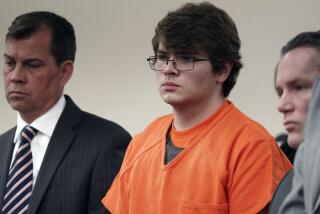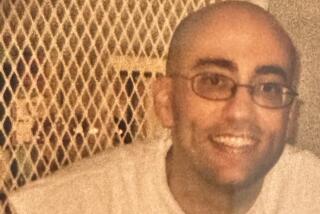Furrow Prosecutors Get OK to Seek His Death
- Share via
A federal judge Monday refused to block prosecutors from seeking the death penalty against avowed white supremacist Buford O. Furrow in the death of a Filipino American letter carrier during an alleged racial shooting rampage last summer.
Furrow, 38, is scheduled to go on trial in November for murder, attempted murder and hate crimes in connection with the Aug. 10, 1999 shootings, allegedly fueled by his racist beliefs.
At a Jewish Community Center in Granada Hills, he allegedly wounded five people, three of them small children. Then in nearby Chatsworth he allegedly shot postal worker Joseph S. Ileto to death because he wasn’t white.
Furrow is eligible for execution if convicted of murdering Ileto, a federal employee, who was shot at close range as he delivered mail. Prosecutors recently announced they would seek the death penalty, a relatively rare occurrence in federal court.
At a federal court hearing in Los Angeles, Furrow’s team of federal public defenders on Monday attacked the Federal Death Penalty Act--and the way it has been applied in the Furrow case--as unconstitutional, vague and overly broad.
But U.S. District Court Judge Nora Manella rejected the challenge, telling lawyers that similar issues already had been decided in other federal courts--most notably in the high-profile cases of Oklahoma City bomber Timothy McVeigh and so-called Unabomber Ted Kaczynski.
Furrow’s defense still has not said publicly whether it plans to employ an insanity defense. The defense must alert prosecutors about its intentions by the end of the month.
Furrow did not attend the hearing. It offered a glimpse of each side’s interpretation of his behavior before, during and after the paroxysm of violence that focused national attention on hate crimes.
The defense argued that the government had not clearly cited which of 14 possible aggravating factors applied to Furrow under the death statute. But prosecutors countered that Furrow is a candidate for the death penalty because he planned his crimes, and showed no remorse for the shooting spree, which by his own admission was motivated by his hatred of nonwhites.
In court papers defending their decision to seek the death penalty, prosecutors alleged that Furrow told the FBI he was at war with the “Jewish controlled” government, shot Ileto because he wanted to instill fear in nonwhites, and wished to kill nonwhite law enforcement officers.
Assistant U.S. Atty. Bobbi Bernstein told Manella that Furrow deliberately planned to commit mass murder of nonwhites in Los Angeles, sending his racist message to the nation. Furrow openly admitted his mission when he turned himself in to the FBI in Las Vegas a day later, she said. And, she added, he still is dangerous.
Sometime last fall, lawyers said, Furrow wrote a note to himself that has become a key piece of evidence:
“You must kill Lopez and all of his avenging angels,” he allegedly scrawled, over and over, 129 times in all. The note was discovered on Oct. 27, during a search at the downtown Metropolitan Detention Center, where Furrow is being held without bail.
To federal prosecutors, the note was a clear death threat against a fellow inmate and several guards.
“It was more than a piece of paper,” argued Assistant U.S. Atty. Michael J. Gennaco. “This was more than a delusional note.”
In the view of Furrow’s lawyers, the obsessive scribbling was “obviously delusional.”
Defense attorneys Marilyn E. Bednarsky, Sean K. Kennedy and Judy Clarke questioned in court papers whether “a psychotic note written to oneself is a threat against anyone.”
The 129 repetitions were no accident, the defense asserted, but rather Furrow’s own peculiar exercise in numerology. Furrow, his lawyers said, reached the number 129 by assigning numerical values to various letters of the alphabet and then adding the total of the inmate’s name, “Lopez,” to that of “Satan.”
More to Read
Sign up for Essential California
The most important California stories and recommendations in your inbox every morning.
You may occasionally receive promotional content from the Los Angeles Times.











